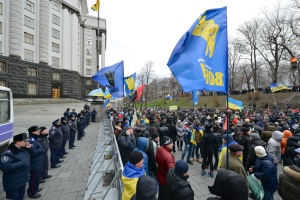The rule of law in times of crisis
[originally published on qceablog.wordpress.com]
There is a crisis on the fringes of the European Union (EU). Many narratives are circulating about Ukraine. Whichever narrative one accepts, the crisis illustrates the difficult issues which arise when European countries try to cooperate. All is well as long as people are content. But when discontent shows in expressions of despair, street demonstrations, protest votes, or violent conflict, the real work of a peace project must begin.
One way to keep a diverse group together despite the vicissitudes of time, people, and economics, is the rule of law. EU officials and politicians often refer to the importance of the rule of law, but what exactly is it? It can be defined as a set-up which expects all, including policy-makers, to be subject to previously agreed legislation.
The Council of Europe, a grouping older than the EU which now numbers 47 countries including Russia and Ukraine, exists to promote democracy, human rights, and the rule of law. One of its special areas of focus is the fight against corruption, as corruption attempts to circumvent the rule of law.
Both the EU and the Council of Europe include courts, indicating that they not only promote the rule of law but also work through the rule of law. So, for example, attempts to require schools to use only Russian language within the territory of Moldova were the subject of a 2012 decision by the Council of Europe’s European Court of Human Rights (ECHR) 17-judge Grand Chamber against Russia (Catan and Others v. Moldova and Russia (applications nos. 43370/04, 8252/05 and 18454/06, 19.10.2012). The Russian Federation was providing essential support to a separatist regime in Transdniestria (within the territory of in Moldova). The Court found that the separatist regime that was enforcing the language policy could not survive without Russia’s continued political, military, and economic support, and that therefore the closure of the schools and the related violation of the right to education was Russia’s responsibility.
Russia is not part of the EU, but it did join the Council of Europe in 1996. I might be biased after many summers in Siberia, a region famous for its lawlessness, but, in my experience, the concept of consistent governance under a pre-agreed set of regulations is not something that makes any sense to Russians, or in Russia. So why did Russia join the Council of Europe? One Russian government website describes the Council of Europe as primarily aimed at promoting social rights:
Its activities in the humanitarian domain are aimed at ensuring security of every European in its broader meaning. The better the guarantees of the social conditions of the human life are, the better the rights record is, the stronger the economy is, the more protected the individual is in society, the less reasons he or she has to resolve problems using force…. Ultimately, the level of mutual integration of European Communities, the strength of contacts between people define mutual understanding and trust – and we can build security only if we trust each other. In doing so, we would put into life the hopes and ideals of the founders of European integration, and of many Europeans generations. This would be the Europe left to us by those who sacrificed their lives during World War II to liberate it from the fascist plague, by those who paid a heavy price for the tragic experience of the 20th century.
Russia is today still part of the Council of Europe, although the voting rights of its delegation of parliamentarians in the Parliamentary Assembly haverecently been suspended. Not only is its support of separatist groups in neighbouring countries irksome and, in the case of Ukraine and other countries such as Moldova, worrisome, but the human rights situation internally in Russia is widely known to be problematic for members of organizations that promote human rights and democracy. Famous cases have been the subject of or mentioned in Council of Europe Parliamentary Assembly (PACE) resolutions: e.g. Sergei Magnitsky, a tax and accountancy expert with a Moscow-based law firm, who died in pretrial detention in Moscow on 16 November 2009: none of the people responsible for his death have yet been punished (Resolution 1966 (2014)). Other cases cited in resolutions of the PACE include the detention of Pussy Riot punk band members, beatings and murders of journalists and individual internet users, and a recent law requiring NGOs receiving funding from abroad to register and self-identify as ‘foreign agents’. Repeated unjustified bans on gay pride marches were the subject of a 2010 judgement in the ECHR against Russia (Alekseyev v. Russia).
Both the Council of Europe and the EU are voluntary institutions: countries may choose to join or leave these clubs. They are clubs based on mutual agreement and respect: the system begins to fail when members ignore the rules agreed. So, for example, the ECHR Grand Chamber found in one recent case (Janowiec and Others v. Russia) that Russia, in refusing to submit a key procedural decision which remained classified, had failed to comply with the obligation to cooperate with the ECHR.
This is an interesting conundrum: the explicit structures set up after the wars in Europe in the first half of the 20th century, require the cooperation of all members and active promotion of the core values. How does such a large grouping of politicians representing nations, respond to conflict and aggression outside its borders? What happens to these values as the governments of the member countries change (or, perhaps, revert to former positions). The issues are certainly not confined to countries outside the EU: there are issues, for example, with responses by national governments to demonstrations against austerity on the streets in Greece and elsewhere.
Today, the European Parliament (an institution of the EU) passed (437 for and 49 against, with 85 abstentions) a resolution supporting Ukraine and calling for protection of the human rights of many groups including Russians and Crimean Tatars, supporting a civilian EU mission to Ukraine in support of the rule of law, and condemning the use by Russia of sanctions in energy access and taxation. During the debate yesterday, non-intervention in Ukraine against Russia was compared with northern European countries standing by while Bosnia was invaded in the 1990s, trusting their traditional allies of Serbia and Croatia until the atrocities being committed became all too apparent.
Do we wait or do we act? Will Russia acquiesce to the signals from the EU or even the Council of Europe? And what are we to do, as promoters of peace and democratic governance, about the rising unrest in Ukraine – or in Greece?



Leave a Reply